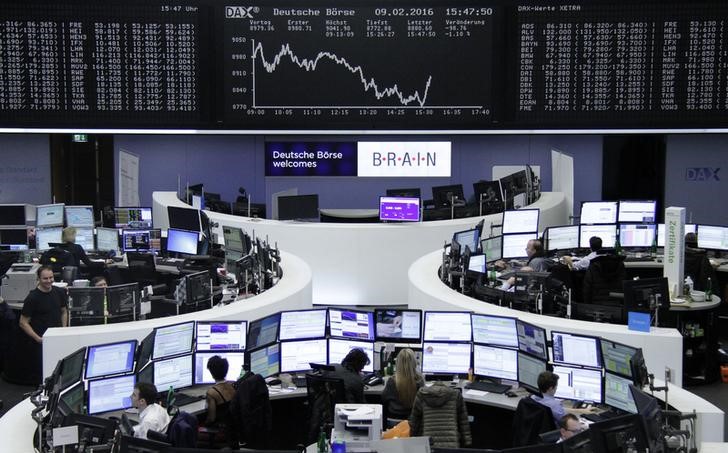By Sam Forgione
NEW YORK (Reuters) - Stock indexes worldwide stumbled on Thursday on fears over the health of the global economy, with banking shares slumping on both sides of the Atlantic, while safe-haven 10-year Treasury yields hit their lowest since 2012.
Concern over sluggish global growth and doubts over central banks' ability to support the global economy pushed the U.S. benchmark S&P 500 index and the Dow Jones industrial average down more than 10 percent for the year.
The FTSEurofirst 300 index of top European shares sank to its lowest level in two and a half years.
The dollar hit its lowest against the safe-haven yen since October 2014 of 110.985 yen, and was on track for its worst week against the Japanese currency since 2008 on the fears over the health of the global economy.
"The key driver is this immense pessimism in asset markets, unwillingness to hold anything but the safest assets," said Steven Englander, managing director and global head of G10 FX strategy at Citigroup (N:C).
Banks in Europe ended 6.3 percent lower, making them the worst-performing sector and widening their losses for the year to more than 28 percent. Shares of Societe Generale (PA:SOGN), France's second-biggest bank, closed down 12.6 percent after disappointing results.
Worries also hit shares of U.S. banks, with the S&P financial index last down 3 percent and ranking as the S&P 500's worst-performing sector. Concerns over profitability in a low-growth, low-interest rate environment have knocked confidence in the banking sector this week, particularly in Europe.
YELLEN
The declines are coming even as Fed Chair Janet Yellen sought to reassure investors in Congressional testimony that the Fed will remain flexible in its approach. However, the markets already do not expect the Fed to raise rates further this year, compared with Fed forecasts that still point to more tightening.
"The central banks have been taking extraordinary policy actions in the last several years...and now we’re seeing that it hasn’t been as effective as everyone had been assuming," said Brad McMillan, chief investment officer for Commonwealth Financial Network in Waltham, Massachusetts.
"When you add in the fact that the European banking system is under serious threat right now, you could actually see a path to the kind of systemic crisis that we had in 2008," he said.
Yields on benchmark 10-year U.S. Treasury notes hit 1.53 percent, their lowest level since August 2012, on the worries over global growth and the effectiveness of central bank policy.
MSCI's all-country world equity index, which tracks shares in 45 nations, was last down 5.3 points, or 1.48 percent, to 352.78. The index hit its lowest level in more than two and a half years and was down over 20 percent from an all-time high.
The Dow Jones industrial average was last down 299.56 points, or 1.88 percent, at 15,615.18. The S&P 500 was down 26.99 points, or 1.46 percent, at 1,824.87. The Nasdaq Composite was down 31.25 points, or 0.73 percent, at 4,252.35.
Europe's broad FTSEurofirst 300 index closed down 3.68 percent at 1,195.76.
Oil prices tumbled, with U.S. crude approaching 12-year lows hit last month on brimming crude inventories and a Goldman Sachs (N:GS) forecast that prices would remain low and volatile until the second half of the year.
Brent crude was last down 27 cents, or 0.88 percent, at $30.57 a barrel. U.S. crude was last down 41 cents, or 1.49 percent, at $27.04 per barrel.

Safe-haven asset gold surged to its highest in a year. Spot gold prices were last up 4.2 percent at $1,247.33 an ounce.